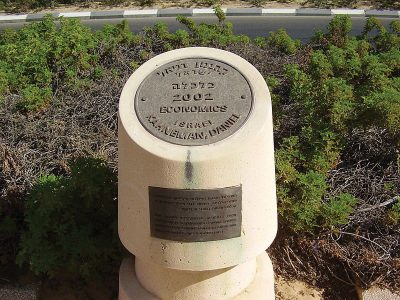×


We have detected your country as:
Please click here to go to the USA website or select another country from the dropdown list.
by: Jo Sarah Stanford, BFP Staff Writer
The Nobel Prize is considered one of, if not the, most prestigious award in recognizing outstanding achievements to science and humanity. The selection process is rigorous, and the award is given only to those who are best in their fields. Out of the 908 individuals who have been awarded the Nobel Prize, 205 have been Jewish. This is made all the more remarkable by the fact that the Jewish people comprise only 0.2% of the world’s population, yet they make up 22.6% of prize winners.
The Nobel Prize was established in 1901 and recognizes individuals or organizations for achievements in the categories of physics, chemistry, physiology or medicine, economic sciences, literature and peace. It was founded by Alfred Nobel (1833–1896)—a successful industrialist and the inventor of dynamite—who, in his will, instructed a fund to be established for prizes to be given annually to those who “during the preceding year, have conferred the greatest benefit to humankind.”
Prize winners are given the title of laureate and awarded a Nobel medal (made from gold), an individually handcrafted diploma and a sizable cash prize (approximately US $1,000,000 for 2018). The prestige from the award, however, is perhaps the greatest prize and is recognized and sought after by academics worldwide.
Jewish Nobel laureates have come from many different countries throughout the years the prize has been awarded. German-born Albert Einstein won the prize for physics in 1921 for “his services to Theoretical Physics, and especially for his discovery of the law of the photoelectric effect.” Henry Kissinger (US secretary of state from 1973–1977) was awarded the peace prize for “the 1973 Paris agreement intended to bring about a cease-fire in the Vietnam War and a withdrawal of the American forces.” In 1994, Yitzhak Rabin (Israeli prime minister from 1974–1977 and 1992 until his death in 1995) and Shimon Peres (then Israeli minister for foreign affairs) shared the peace prize for their efforts in the Oslo Accords “to honour a political act which called for great courage on both sides, and which has opened up opportunities for a new development towards fraternity in the Middle East.” Bob Dylan (American singer and songwriter) was awarded the prize for literature in 2016 for “having created new poetic expressions within the great American song tradition.”
However, some awards have not been without controversy. Many people believed that Kissinger should not have been awarded the peace prize, as America was still involved in the Vietnam conflict at the time. In 1995, shortly after signing the Oslo Accords and being awarded the peace prize, Prime Minister Rabin was assassinated by someone who disagreed with the Israeli–Palestinian peace treaty.
There were also some worthy candidates who missed out on the award. Boris Pasternak, a Russian Jew, was awarded the Nobel Prize in Literature in 1958 for “his important achievement both in contemporary lyrical poetry and in the field of the great Russian epic tradition.” However, after intense pressure from the Soviet government, he was forced to decline the prize. His book Doctor Zhivago was banned in Russia, but was smuggled out of the country and became famous worldwide.
Lise Meitner was a scientist and the first woman to gain the title of professor of physics at the Berlin University in Germany. She was forced to flee for her life in 1938 in the lead-up to the Holocaust. Later in 1945, her research partner Otto Hahn received the Nobel Prize in Chemistry for work on nuclear fission, but many believed that Meitner should have also shared in the prize. Even today it is unclear as to why she was overlooked.

Monument honoring 2002 Economics laureate Daniel Kahneman on Nobel Laureates Blvd/Promenade in Rishon LeZion, Israel.
Since the inception of the Nobel Prize, there has been a high percentage of Jewish laureates, but the phenomena gained special attention in 2013 when six out the 12 laureates were Jewish. Many researchers and commentators have weighed in on the conversation, but most are at a loss as to why the percentage of Jewish winners is so high. In the Algemeiner, Professor Richard Dawkins suggests that it is because “something about the cultural tradition of Jews is way, way more sympathetic to science and learning and intellectual pursuits…”
To commemorate these achievements, Israel has built the Nobel Laureates Boulevard. Just south of Tel Aviv, in the city of Rishon LeZion, there is an avenue containing a memorial plaque for each of the Jewish Nobel Prize winners.
The most recent awards have seen yet more Jewish names claim the title of Nobel laureate. In 2018 there were two Jewish winners. US scientist Arthur Ashkin received the prize in physics for “the optical tweezers and their application to biological systems.” At 96 years of age, he is the oldest person to be awarded the prize. Ashkin, though pleased with the award, has not made a fuss about it. “I’m very old and had given up worrying about things like Nobel Prizes,” he told the Associated Press. He no longer sees his scientific study as work, but rather as a hobby.
Perhaps Ashkin’s attitude holds the secret to the high rate of Jewish laureates in the Nobel Prize: a love and passion for learning that drives them to success. As the most famous of Jewish laureates, Einstein, once wrote to his son, “That is the way to learn the most, that when you are doing something with such enjoyment that you don’t notice that the time passes.”
All logos and trademarks in this site are property of their respective owner. All other materials are property of Bridges for Peace. Copyright © 2024.
Website Site Design by J-Town Internet Services Ltd. - Based in Jerusalem and Serving the World.